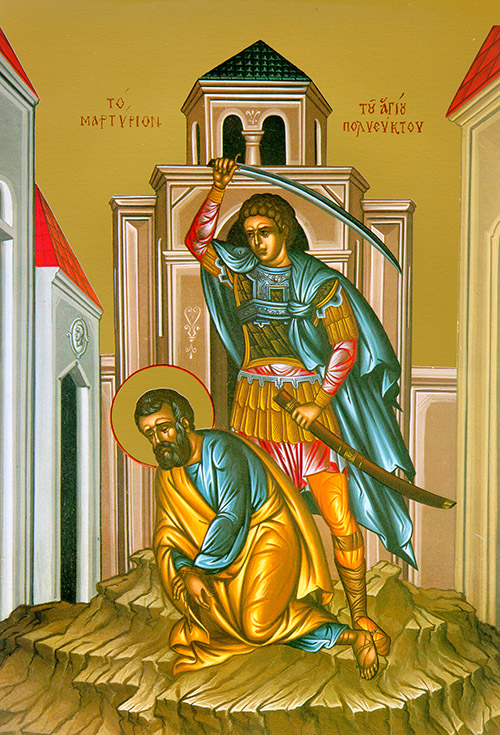

The holy martyr Polyeuctus: The Armenian city of Melitene was drenched with the blood of Christians, as was the entire country of Armenia. The first blood shed for Christ in this city was that of St. Polyeuctus in the year 259, during the reign of Valerian. In Melitene were two friends: Nearchus and Polyeuctus. Both were officers- Nearchus was baptized and Polyeuctus was unbaptized. When the command of the emperor was sent out concerning the persecution of Christians, Nearchus prepared for death; but he was in great sorrow because he had not succeeded in converting his friend Polyeuctus to the true Faith. When Polyeuctus learned of the reason for Nearchus’s sorrow, he promised to embrace the Faith. The following day Polyeuctus related this dream to Nearchus: the Lord Himself had appeared to him in light, removed Polyeuctus’s old clothes from him and dressed him in radiant new clothes – and sat him in the saddle of a winged horse. After this, Polyeuctus went to town, shredded the emperor’s decree concerning the torturing of Christians, and destroyed many statues of idols. He was tortured and condemned to death. When he was brought to the place of execution, he looked at Nearchus in the throng of people and joyfully cried out to him: “Save yourself, my dear friend! Remember the vow of love confirmed between the two of us!” later, St. Nearchus died by fire as a martyr for Christ.
Troparion
Your martyr Polyuectus, O Lord our God, in his struggle received an incorruptible crown from You. With Your strength, he brought down the tyrants and broke the cowardly valor of demons. Through his prayers, O Christ our God, save our souls.
Kontakion
When our Savior bowed His head in the Jordan River, the heads of the serpents were crushed, and when Polyeuctus was beheaded, he put demons to shame.
Epistle
James 3: 1-10
Brothers and sisters, not many of you should become teachers; you should realize that those of us who do so will be called to the stricter account. All of us fall short in many respects. If a person is without fault in speech he is a man in the fullest sense, because he can control his entire body. When we put bits into the mouths of horses to make them obey us, guide the rest of their bodies. It is the same with ships: however large they are, and despite the fact that they are driven by fierce winds, they are directed by very small rudders on whatever course the steerman’s impulse may select. The tongue is something like that. It is a small member, yet it makes great pretensions.
See how tiny the spark is that sets a huge forest ablaze! The tongue is such a flame. It exists among our members as a whole universe of malice. The tongue defiles the entire body. Its flames encircle our course from birth, and its fire is kindled by hell. Every form of life, four-footed or winged, crawling or swimming, can be tamed, and has been tamed, by mankind; the tongue no man can tame. It is a restless evil, full of deadly poison. We use it to say, “Praised be the Lord and Father”; then we use it to curse men, though they are made in the likeness of God. Blessing and curse come out of the same mouth. This ought not to be, my brothers and sisters!
Gospel
Mark 11: 11-24
At that time Jesus entered Jerusalem and went into the temple precincts. He inspected everything there, but since it was already late in the afternoon, he went out to Bethany accompanied by the Twelve. The next day when they were leaving Bethany he felt hungry. Observing a fig tree some distance off, covered with foliage, he went over to see if he could find anything on it. When he reached it he found nothing but leaves; it was not the time for figs. Then addressing it he said, “Never again shall anyone eat of your fruit!” His disciples heard all this.
When they reached Jerusalem he entered the temple precincts and began to drive out those who were engaged in buying and selling. He overturned the money-changers’ tables and the stall of the men selling doves; moreover, he would not permit anyone to carry things through the temple area.
Then he began to teach them: “Does not Scripture have it, ‘My house shall be called a house of prayer for all peoples’? But you have turned it into a den of thieves.” The chief priests and the scribes heard of this and began to look for a way to destroy him. They were at the same time afraid of him because the whole crowd was under the spell of his teaching. When evening drew on, Jesus and his disciples went out of the city. Early next morning, as they were walking along, they saw the fig tree withered to its roots. Peter remembered and said to him, “Rabbi, look! The fig tree you cursed has withered up.” In reply Jesus told them: “Put your trust in God. I solemnly assure you, whoever says to this mountain, ‘Be lifted up and thrown into the sea,’ and has no inner doubts but believes that what he says will happen, shall have it done for him. I give you my word, if you are ready to believe that you will receive whatever you ask for in prayer, it shall be done for you.”
Icon courtesy of Jack Figel, Eastern Christian Publications – ecpubs.com
Monday, January 8 –